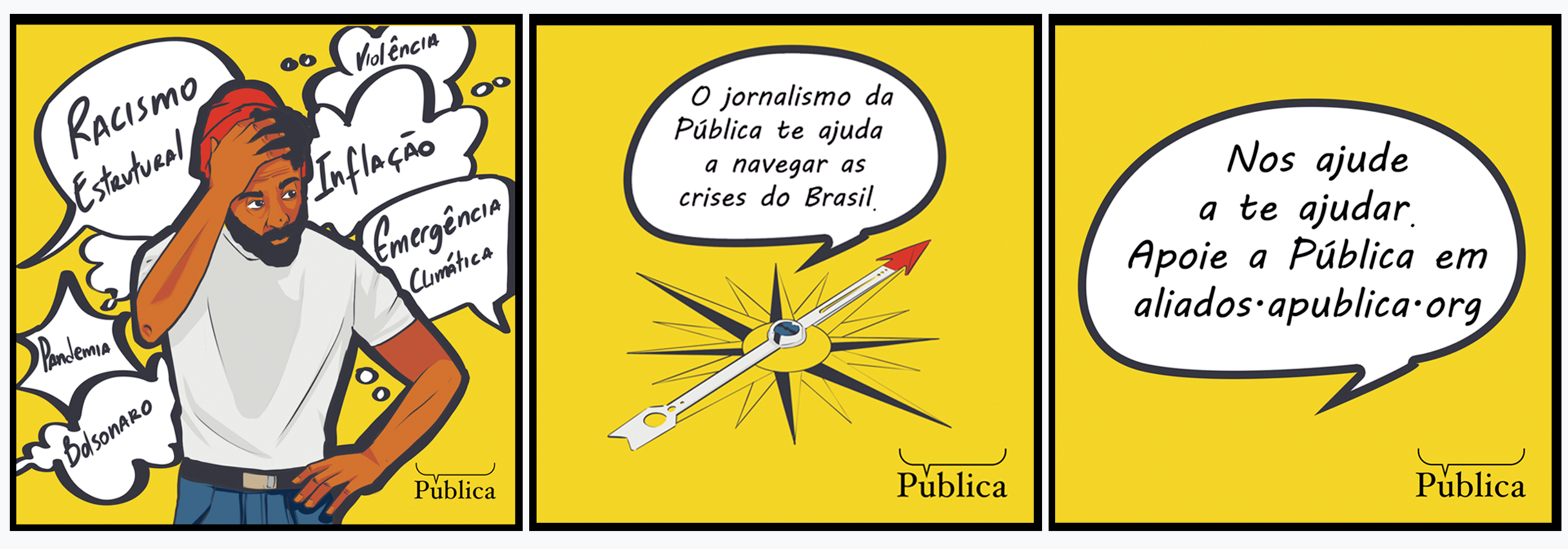Among a host of images of saints and Afro-Brazilian divinities known as orixás, Abel José, 42, an Umbanda priest, lights some candles, picks up his protective beads and adjusts the straw hat that sits atop his head. He is preparing to treat four people from neighboring villages who have come to his house in search of spiritual help and treatment for health ailments.
The meeting takes place discreetly, in a small room that has been built in the back of the garage of his house. Abel lives in the quilombo of Sítio Bredos, home to 135 families. The community, located in the municipality of Betânia of Brazil’s northeastern state of Pernambuco, is one of the municipality’s four remaining communities that have been certified as quilombos, the word used to refer to communities formed in the colonial era by enslaved Africans and/or their descendents.
In these villages there are almost no residents who still follow traditional Afro-Brazilian religions. Abel, Seu Joaquim Firmo and Dona Maura Maria da Silva are the sole remaining followers of Umbanda in the communities in which they live. A wave of evangelical missionary activity has taken hold of Betânia’s quilombos ever since the first evangelical church belonging to the Assembleia de Deus group was built in the quilombo of Bredos around 20 years ago. Since then, other evangelical, pentecostal, and neo-pentecostal churches and congregations have established themselves in the area. Today there are now nine temples spread among the four communities, home to roughly 900 families.
The temples belong to the Assembleia de Deus, the Seventh-day Adventist Church, and the World Church of God’s Power, the latter of which has over 6,000 temples spread across Brazil and was founded by the apostle and televangelist Valdemiro Santiago, who became infamous during the pandemic for trying to sell beans that he had blessed as a Covid-19 cure. Assembleia de Deus alone, who are the largest pentecostal denomination in the world, have built five churches in Betânia’s quilombos.

African religions losing ground
As the evangelical churches have multiplied in the traditional communities, it is the religions of African origin that have been losing ground. The last surviving practitioners of Umbanda are isolated and have faced pressure to abandon their rituals. Abel, Joaquim, and Maura, however, continue to resist.
Followers of Umbanda in Brazil tend to congregate in spaces known as terreiros to perform their collective ceremonies. Rituals in the quilombos of Betânia, however, are carried out on an individual basis, in hidden rooms of the resident’s houses, based on the teachings they learned from their ancestors. The communities’ Umbanda believers are fearful of the prejudice that they suffer from because of their religion, which is often demonized by Christian traditions. The followers report being constantly approached by local pastors, who try to evangelize them, and have even reported being pressured by their own family members, many of whom have long since converted to evangelism.
Dona Maura Maria, 73, lives in Betânia’s largest quilombo, São Caetano, along with nearly 400 families. Maura’s evangelical neighbors and relatives have already tried to convert her on a number of occasions and she says she has considered changing her religion because of the judgements she receives.
“Many people don’t understand what we do. They don’t understand the good we bring to so many people. They think we’re doing bad things,” she said. “Everywhere you go, there are those who use their faith to do good, and those who use it to do bad. This is human. I once thought of converting, but my guiding voice told me ‘don’t do it. Your religion also abides by God’s law’. So I didn’t. I’ve worked [as an Umbanda priestess] for more than fifty years.”
People get angry and judge
Abel lives with his wife and two children in the quilombo of Bredos, where there are four evangelical churches. He said he developed his mediumship at the age of 14, but that he too has thought about converting. His wife and two children are all evangelical Christians, and attend an Assembleia de Deus church.
“People get angry with people who are involved with this kind of thing [religions of African origin]. A lot of what people directed at me, in terms of judgements, bad things, ended up spilling over onto my wife and my family. She switched to evangelism because of that.”
His belief that he has a mission to fulfill in Umbanda is what drives Abel to resist the pressure he faces to abandon his faith.
“Many people come to me directly [asking] for me to pray [for them]. [To cure] evil eye, headaches, to stop drinking, health problems. This also motivates me to keep following the religion,” Abel said.
As well as the people that Abel used to receive in his home, there are those who are referred by his aunt, Dona Francisca dos Santos, a former Umbandista who gave in to the haranguing she faced from relatives and neighbors and finally converted around a year ago.
The arrival of evangelical temples changed the dynamics of the coexistence of religious denominations in the quilombos of Betânia that had previously prevailed. Just as in many rural communities in the Sertão, the arid backlands of northeastern Brazil, for many years, Umbanda practitioners lived alongside followers of so-called popular Catholicism. Nowadays, such communities are increasingly restricting the space for the worship and practice of other religions, especially those of African origin.

People have to respect others
Maria Helena dos Santos, 54, has been the community leader of the quilombo of Bredos since 2006. She is an evangelical Christian and attends the Seventh Day Adventist Church. She claimed that in Betânia’s quilombos there is room for the practice of any kind of religion.
“The church has to understand that every person is free to live according to their own choices. We know that there is only one creator and he is the father of us all. Independent of anything else, people have to respect the will of others, independent of whatever religion they wish to follow.”
However, Joaquim Filho, 73, said that it is a common occurrence for pastors from local churches to pass by his door and attempt to evangelize him. Joaquim stopped doing Umbanda work after Dona Francisca converted. He said that she contributed to his initiation and that he used to walk for about two hours from Bredos to the neighboring quilombo, Teixeira, to meet her.
“I lost my taste for things. Now I don’t do any more [Umbanda] work. If someone comes to my door, I bless them with leaves. I still pray against evil eye, but I don’t do any [other] work anymore.”
Joaquim’s evangelical family members also tried to convert him. He said that he already gave in and agreed to accompany his daughter to an Assembleia de Deus church. Joaquim, however, said that he went against his own will: “My heart won’t take it,” he said.

Freedom of belief
Freedom of belief is a right that is enshrined in the Brazilian Constitution. However, according to a 2022 survey by the National Network of Afro-Brazilian Religions and Health, which interviewed 255 Umbanda religious leaders from across Brazil, 80% of people in their communities had suffered some kind of violence, be it physical or verbal, because of racially-charged religious hate.
In Betânia’s quilombos, although no instances have been recorded of physical attacks on followers of Afro-Brazilian religions, reports of insults and thinly veiled verbal violence are commonplace. The Umbanda practitioners interviewed by Agência Pública spoke of how pastors and members of local evangelical churches carry out evangelization visits to the homes of the unconverted quilombolas to present the gospel to them.
After the visit, they are encouraged to distance themselves from their ancestral traditions, since they involve religious practices that the church disapproves of, such as keeping images of orixás at home.
Carolina Rocha, a doctor in sociology and a historian, writer, and researcher at the State University of Rio de Janeiro (UERJ), explained that the erasure, persecution and criminalization of traditions of African origin in Brazil is not a new phenomenon, indeed it is part of the country’s history. The researcher said that racism and religious intolerance can not only be found in the religious sphere, but are also reproduced by other power structures.
“It’s not just the churches that are disempowering these Quilombola communities. The [Brazilian] State itself is also hostile and racist [towards them]. The justice system, which takes children away from their mothers or fathers because they took them to terreiros, is racist. The school system, as an institutional space that reinforces stereotypes and is closed off to learning about and discussing religious beliefs other than the Christian one, is racist.”
Agência Pública contacted the pastors of the evangelical churches who maintain a presence in Betânia’s quilombos for comment, however none of them wished to speak to reporters.











